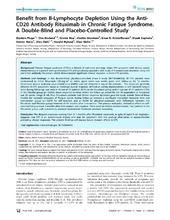| dc.contributor.author | Fluge, Øystein | en_US |
| dc.contributor.author | Bruland, Ove | en_US |
| dc.contributor.author | Risa, Kristin | en_US |
| dc.contributor.author | Storstein, Anette | en_US |
| dc.contributor.author | Kristoffersen, Einar K. | en_US |
| dc.contributor.author | Sapkota, Dipak | en_US |
| dc.contributor.author | Næss, Halvor | en_US |
| dc.contributor.author | Dahl, Olav | en_US |
| dc.contributor.author | Nyland, Harald | en_US |
| dc.contributor.author | Mella, Olav | en_US |
| dc.date.accessioned | 2012-02-21T12:52:36Z | |
| dc.date.available | 2012-02-21T12:52:36Z | |
| dc.date.issued | 2011-10-19 | eng |
| dc.Published | PLoS ONE 6(10): e26358 | en |
| dc.identifier.issn | 1932-6203 | |
| dc.identifier.uri | https://hdl.handle.net/1956/5631 | |
| dc.description.abstract | Background: Chronic fatigue syndrome (CFS) is a disease of unknown aetiology. Major CFS symptom relief during cancer chemotherapy in a patient with synchronous CFS and lymphoma spurred a pilot study of B-lymphocyte depletion using the anti-CD20 antibody Rituximab, which demonstrated significant clinical response in three CFS patients. Methods and Findings: In this double-blind, placebo-controlled phase II study (NCT00848692), 30 CFS patients were randomised to either Rituximab 500 mg/m2 or saline, given twice two weeks apart, with follow-up for 12 months. Xenotropic murine leukemia virus-related virus (XMRV) was not detected in any of the patients. The responses generally affected all CFS symptoms. Major or moderate overall response, defined as lasting improvements in self-reported Fatigue score during follow-up, was seen in 10 out of 15 patients (67%) in the Rituximab group and in two out of 15 patients (13%) in the Placebo group (p = 0.003). Mean response duration within the follow-up period for the 10 responders to Rituximab was 25 weeks (range 8–44). Four Rituximab patients had clinical response durations past the study period. General linear models for repeated measures of Fatigue scores during follow-up showed a significant interaction between time and intervention group (p = 0.018 for self-reported, and p = 0.024 for physician-assessed), with differences between the Rituximab and Placebo groups between 6–10 months after intervention. The primary end-point, defined as effect on selfreported Fatigue score 3 months after intervention, was negative. There were no serious adverse events. Two patients in the Rituximab group with pre-existing psoriasis experienced moderate psoriasis worsening. Conclusion: The delayed responses starting from 2–7 months after Rituximab treatment, in spite of rapid B-cell depletion, suggests that CFS is an autoimmune disease and may be consistent with the gradual elimination of autoantibodies preceding clinical responses. The present findings will impact future research efforts in CFS. | en_US |
| dc.language.iso | eng | eng |
| dc.publisher | Public Library of Science | eng |
| dc.rights | Attribution CC BY | eng |
| dc.rights.uri | http://creativecommons.org/licenses/by/2.5/ | eng |
| dc.title | Benefit from B-Lymphocyte Depletion Using the Anti- CD20 Antibody Rituximab in Chronic Fatigue Syndrome. A Double-Blind and Placebo-Controlled Study | en_US |
| dc.type | Peer reviewed | |
| dc.type | Journal article | |
| dc.description.version | publishedVersion | en_US |
| dc.rights.holder | Copyright 2011 Fluge et al. | |
| dc.identifier.doi | https://doi.org/10.1371/journal.pone.0026358 | |
| dc.subject.nsi | VDP::Medical disciplines: 700::Clinical medical disciplines: 750 | eng |
| dc.subject.nsi | VDP::Medical disciplines: 700::Clinical medical disciplines: 750::Oncology: 762 | eng |

